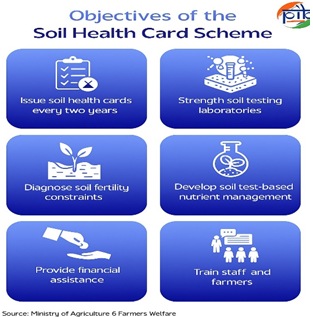

19th August 2025 (18 Topics)
Context:
As of July 2025, over 25 crore Soil Health Cards have been distributed to farmers across India, supported by 8,272 soil testing labs and digital upgrades like GIS mapping and QR-coded SHC mobile app.
About the Scheme
- Launched:19 February 2015 at Suratgarh, Rajasthan.
- Objective: To assess soil nutrient status and provide recommendations every two years.
- Since 2022–23, merged with Rashtriya Krishi Vikas Yojana (RKVY) under the component “Soil Health & Fertility”.
Features of Soil Health Card (SHC) 
- Printed/digital report covering 12 key parameters:
- Macro-nutrients: N, P, K, S.
- Micro-nutrients: Zn, Fe, Cu, Mn, B.
- Other indicators: pH, EC, OC.
- Suggests use of fertilisers, bio-fertilisers, organic inputs, and soil treatments.
- Validity:3 years.
Implementation Infrastructure
- ?1,706 crore released (till Feb 2025).
- 8,272 labs: 1,068 static, 163 mobile, 6,376 mini, 665 village-level labs.
- Soil mapping: 290 lakh hectares in 40 aspirational districts.
- Village-level fertility maps: 1,987 prepared in 21 States/UTs.
Innovations
- Digital SHC Portal & Mobile App (NIC-developed): QR-code linked, GPS-based soil sampling, GIS integration, real-time lab uploads.
- School Soil Health Programme: Labs in 1,021 schools, 1,32,525 students engaged in soil testing and farmer awareness.
- Village Level Soil Testing Labs (VLSTLs): Opened to rural youth, SHGs, FPOs.
Benefits & Impact
- Promotes balanced fertiliser use, reduces input costs, improves yields (e.g., Bihar farmer case study: 16% yield increase).
- Builds farmer awareness and improves long-term soil fertility.
- Encourages climate-resilient agriculture and sustainable resource management.



